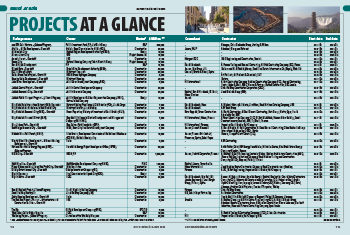
 Webster ... White Book fails to deal adequately with some issues.
Webster ... White Book fails to deal adequately with some issues.
THE Federation Internationale des Ingenieurs-Conseils (Fidic) suite of contracts is commonly used in the UAE and the wider Middle East region as a starting point for drafting all manner of construction contracts.
The Red Book (build only), Silver Book (design and build/EPC turnkey) and Yellow Book (design and build/electrical and mechanical) – all of which are commonly used in the region – are reasonably well drafted and provide a good platform for the drafting and negotiation of contracts to the extent that they are relevant to the type and nature of the works being governed.
The White Book, 2006 edition, (consultancy services), however, is somewhat less well thought through and a number of holes in the drafting are apparent, which may expose the unwary to unnecessary risk.
The consultancy services agreements that we see on a large number of the projects are largely based on the Fidic White Book with limited, if any, amendments. This is of some concern as the Fidic White Book (even the recently updated 2006 edition on which this commentary is based) fails to deal adequately with many of the issues that are essential to a consultant’s appointment. Some of the provisions that could benefit from clarification from a client’s standpoint are as follows:
• Clause 3.3.1 provides that the consultant shall have no other responsibility than to exercise reasonable skill, care and diligence in the performance of its obligations under the agreement.
This provision is too widely drafted as it contemplates that the same standard of care is to be applied, not only to the manner in which the consultant performs the services, but also in relation to other obligations such as the duty to commence on the date of commencement, the duty to give prompt notice of changed circumstances and the duty to take out and maintain PI (professional indemnity) insurance, amongst others. We would typically suggest that obligations other than those in relation to performance of the services should be absolute and not made subject to any test of reasonableness.
• Under Clause 3.5.1, the personnel proposed by the consultant are subject to acceptance by the client with regard to their qualifications and experience. There is no continued requirement, however, for the consultant to keep such personnel working on the project. We would prefer to see an express obligation on the consultant not to remove key personnel from a project without the client’s prior written approval.
• The consultant is obliged to submit proposals for varying the services if requested to do so by the client. By virtue of Clause 4.3.3, the client has no right to require the consultant to carry out the varied services proposed if the fees associated with such services have not been approved. We consider that the consultant should be obliged to perform the varied services, unless the client agrees otherwise.
• If circumstances arise for which neither the client nor the consultant is responsible and which make it “irresponsible or impossible” for the consultant to perform the services, Clause 4.5 states that the consultant shall be entitled, on giving prompt notice to the client, either to suspend the services or reduce the speed at which the services are performed. As a matter of clarification, we would query what is meant by the word “irresponsible” in this context. Also, what circumstances would make it irresponsible on the part of the consultant to continue to perform the services?
• Clause 6.1.1 provides that the consultant shall only be liable to pay compensation to the client in the event that a breach of its duty of care under Clause 3.3.1 is established against it. We would recommend that this provision be limited to performance of the services by the consultant and not to those obligations that should be absolute as highlighted above.
• Clause 6.1.3(c) provides that if “it is considered that either party is liable to the other, compensation shall be payable … if either party is considered to be liable jointly with third parties to the other, the proportion of compensation payable by that party shall be limited to that proportion of liability, which is attributable to (its) breach”.
A net contribution clause of this nature limits the damages that the client can recover from the consultant under the agreement to that portion for which it is liable. This means that in the event of the insolvency of another consultant who has joint liability, the client will not recover in full its losses.
• Clause 6.4.1 provides that “the client shall indemnify the consultant against the adverse effects of all claims including claims by third parties which arise out of or in connection with the agreement including any made after the expiry of the period of liability” provided for in Clause 6.2.1.
This provision renders the client liable for an unlimited period of time (beyond the expiry of the contractual limitation period within which the consultant must bring any claim against the client) for all claims brought against the consultant, including those arising as a result of the consultant’s own acts or omissions, save for those covered by insurances. This is a highly unusual provision and an unduly onerous obligation for a client to assume.
• Clause 7.1 provides that the client can request in writing that the consultant insures against his liability to the public or third parties but the consultant is only obliged to make reasonable efforts to effect such insurance. Similarly, under Clause 7.2, the consultant is only required to make reasonable efforts to insure on terms acceptable to the client against loss or damage to the property of the client and against liabilities arising out of the use of such property, and only upon written request from the client. We would normally expect to see an absolute obligation on the consultant to insure, provided insurance is available in the open market.
• Further provisions of Clauses 7.1 and 7.2 provide that the cost of all of the above insurances known at the time of appointment shall be deemed to be incorporated into the consultant’s fees and any increase or variation in such insurance shall be at the expense of the client. We would suggest that any increase in the cost of insurance, which is the result of the consultant’s own claims records, should be met by the consultant, not the client.
* Adam Webster is a Bahrain-based associate at the legal practice of Norton Rose (Middle East) LLP. Legal queries related to the construction sector can be addressed to Norton Rose (Middle East) LLP through Gulf Construction magazine at editor@gulfconstructionworldwide.com. Norton Rose Group has had a presence in the Middle East for 30 years and has advised developers, lenders, and contractors in relation to the legal aspects of a wide variety of construction and infrastructure projects in the region. With a combined team located in Bahrain, Dubai and Abu Dhabi, Norton Rose (Middle East) LLP is able to provide both contentious and non-contentious support to financiers, developers, contractors and specialist contractors in the region.










 BIG.jpg)

.jpg)

























.jpg)












